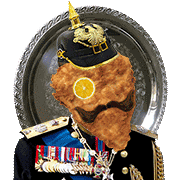|
Also tbh King Leopold's Ghost is one of the most depressing history books I can think of and it's normal to be bummed out after reading that. The Congo Free State is top level 
|
|
|
|

|
| # ? May 15, 2024 03:48 |
|
I don’t know if it’s “uplifting” per se, but I really enjoyed Pedestrianism by Matthew Algeo. it’s a history of when watching people walk around a track and go on long, long walks between cities was incredibly popular. it’s a goofy subject matter and was a nice palate cleanser in between depressing books on historical revolutions
|
|
|
|
Chris Jennings' Paradise Now, about 19th century American utopian communities, is pretty great, and yes, even a little uplifting. He's got a real affection for the material, and it's just so darn earnest and sincere. And Charles Fourier sounds like a delightful nutcase.
|
|
|
|
King Leopold's Ghost just... just absolutely wrecked me for like a week. I'll second all of the Kurlansky books that were mentioned; something mind-relaxing about well-written deep dives into the history of something seemingly innocuous that actually fundamentally altered how civilizations happened. I also want to note that I love/hate this thread because I only pop in every couple of months but every time I do I end up dropping a hondo on amazon.
|
|
|
|
Try Steven Johnson's stuff. I personally enjoyed How We Got to Now and The Ghost Map. The Invention of Air is okay but it turns out I am not that interested in Joseph Priestley.
|
|
|
|
Bill Bryson’s ‘At Home: A Short History of Private Life’ is a really amusing and interesting look deep look at houses, especially 19th c. English and American houses, and the people who lived in them. Kind of of in the Mary Roach/Mark Kurlansky vein but with a bit more Bill Bryson wit. The audiobook is very good too.
|
|
|
|
Grand Fromage posted:Also tbh King Leopold's Ghost is one of the most depressing history books I can think of and it's normal to be bummed out after reading that. The Congo Free State is top level Is it more or less depressing than Ordinary Men? Someone mentioned earlier the Third Reich trilogy by Richard Evans. How does it compare to Shirer’s Rise and Fall of?
|
|
|
|
StrixNebulosa posted:Bringing this post back because it's one of my favorite book reviews. Also I finally snapped and bought the first volume, what can go wrong? It's really good, so not much. Sumption is really good at mingling in the details with the drama of the personalities and events to keep things feeling lively despite how dense and long it is. Two thoughts from vol 1: (1) I was not exactly surprised but still somewhat amused at how tied events were to taxation and problems with finance - although that description in abstract terms makes it sound grander than it was, as the problems and their solutions often seemed ineffably petty. (2) I wonder how much Sumption's interest in law came from his work as a historian (albeit his main reason for moving to law was money, as he himself as said). It seems like court and tribunal documents were incredibly useful for his historical work, and he remarks more than once on how important legalities were for medieval rulers.
|
|
|
|
Look Sir Droids posted:Is it more or less depressing than Ordinary Men? Shirer is way outdated. I haven’t read Evans but if he isn’t leaning hard into the Sonderweg thesis he’s already miles ahead. Not that Rise and Fall is BAD, it’s just a product of its time. Also I’d say Leopolds ghost manages to be more depressing than ordinary men. They’re both rough but you kind of know what you’re getting into when you grab a book on the Holocaust. No matter how hosed you think you know the Belgian Congo was leopold managed to make you go  for it’s entirety. for it’s entirety.
|
|
|
|
Shirer's is basically a primary source, it was published less than 15 years after the fall of the reich and was the first attempt at historicizing something that was still in the popular memory to the extent that it was not yet seen as history.
|
|
|
|
Vasukhani posted:Shirer's is basically a primary source, it was published less than 15 years after the fall of the reich and was the first attempt at historicizing something that was still in the popular memory to the extent that it was not yet seen as history. Yes, which is why I don't consider it exactly bad. The problem is that he tries to do some historical lifting (especially towards the beginning) that really falls flat today. If you read it critically, knowing what it is and knowing what the strengths and weaknesses are, it's great. The problem comes in when people, especially students, read it without that critical eye and just accept it as received wisdom. The Sonderweg issue is the biggest one and the one that leaps most immediately to mind and I'm too lazy to go grab my copy and page through my notes, so it's what I'm focusing on. If I'm a bit sensitive to it, it's because back when I taught that was easily the number one source for the Sonderweg creeping into student papers, and every time I see some old fart on a milhist forum start in about how Martin Luther lead to Hitler Shirer crops up again. Now, if you want a primary source from him without the 'basically' caveat, check out his Berlin Diaries. edit: I'll always have a soft spot for it, though. It was one of the first real deal history books I read, back in the 4th grade. A re-reading of it early in HS had me cock my eyebrow at the Sonderweg stuff, which got me reading some more recent books specifically on that, which was my introduction to the idea that historians can disagree with each other.
|
|
|
|
I read Shirer about 20 years ago. I only recall it as a log of what happened, not why it happened.
|
|
|
|
Look Sir Droids posted:Is it more or less depressing than Ordinary Men? different types of depressing. parts of king leopold cover the same ground as ordinary men(how hosed up systems turn people into monsters) but its also more on colonialism and its horrors.
|
|
|
|
The profs in my department would specifically warn off people from using Shirer for anything other than eyewitness accounts, the only book for WWII specifically called out that way as it's such a mix of over-relied on and shaky in parts. The Evans trilogy is modern scholarship by one of the leading figures in the field: it's light-years ahead of Shirer.
|
|
|
|
Look Sir Droids posted:Someone mentioned earlier the Third Reich trilogy by Richard Evans. How does it compare to Shirer’s Rise and Fall of? I looked through it recently and there's a lot of stuff which dates the book quite a bit. He cites the Journal of Maxim Litvinov as a source on the Soviet Union for instance, a book which you won't find referred to in modern volumes because it turned out to be fake.
|
|
|
|
cloudchamber posted:He cites the Journal of Maxim Litvinov as a source on the Soviet Union for instance, a book which you won't find referred to in modern volumes because it turned out to be fake. Hah, when was this revealed?
|
|
|
|
Xotl posted:Hah, when was this revealed? I don't think there was a date in which it was revealed to be fake exactly. As soon as it was released a lot of Soviet scholars pointed to a huge number of issues with it, but a very influential one called EH Carr, claimed that there was some truth in the book despite acknowledging its flaws. (He took this position probably because the journal seemed to hold evidence backing his perspective on aspects of Stalin's decision making.) A load of writers, including Shirer, took the supposed journal serious due to this, but since Carr's death and the waning of his stature in Soviet historiography virtually everyone has dismissed it as phony.
|
|
|
|
Look Sir Droids posted:I read Shirer about 20 years ago. I only recall it as a log of what happened, not why it happened. Nah, his basic idea was the fascism was a German feature, rather than something imposed on Germany, he ends up using sonderweg to push back on the "good germans" that was very present in 1960 America.
|
|
|
|
cloudchamber posted:I don't think there was a date in which it was revealed to be fake exactly. As soon as it was released a lot of Soviet scholars pointed to a huge number of issues with it, but a very influential one called EH Carr, claimed that there was some truth in the book despite acknowledging its flaws. (He took this position probably because the journal seemed to hold evidence backing his perspective on aspects of Stalin's decision making.) A load of writers, including Shirer, took the supposed journal serious due to this, but since Carr's death and the waning of his stature in Soviet historiography virtually everyone has dismissed it as phony. I've done a dive into JSTOR, etc., about it. I found some interesting commentary on the "journal" and other forgeries apparently by the same people: https://www.foreignaffairs.com/reviews/capsule-review/1956-04-01/notes-journal (amusingly concise April 1956 review) Wolfe, Bertram D. "The Case of the Litvinov Diary." Encounter, January 1956, pp. 39-47. https://voiks.livejournal.com/312858.html. (The same article can be found on Commentary, but finding an article like this on Livejournal amuses me. Points out errors and implausibilities, as well as (self-)plagiarism from memoirs of former Soviet diplomat Gregory Bessedovsky.) Blackstock, Paul W. “‘Books for Idiots’: False Soviet ‘Memoirs.’” The Russian Review, vol. 25, no. 3, 1966, pp. 285–296. JSTOR, https://www.jstor.org/stable/126957. (On the bogus Soviet memoirs produced by a group of emigres led by Bessedovsky, including "Litvinov's" journal.) Agursky, Mikhail. “SOVIET DISINFORMATION AND FORGERIES.” International Journal on World Peace, vol. 6, no. 1, 1989, pp. 13–30. JSTOR, https://www.jstor.org/stable/20751319. (Outright claims that Bessedovsky was a Soviet agent all along; I'm not sure of the truth of this.) Basically, everyone with any real knowledge of the USSR except Carr realized that it was probably fake almost immediately, but the fakeness gradually became even more obvious over time.
|
|
|
|
Like a lot of people who just watched The Irishman, I'm looking for a Jimmy Hoffa biography - any good ones out there? Preferably not a lurid true-crime one, or a "organized labor is inherently corrupt" one either.
|
|
|
|
|
Anyone have a biography of Edward III that looks at his character closely as well as the events he was involved in? He interested me a great deal in reading vol 1 of Sumption's Hundred Years' War history - a complex mix of positive and negative attributes; impetuous, forceful, in some periods unreasonably irascible (the poor civil servants who had to collect tax!), but also brave, clever in his cooler moments, and hugely charismatic. Since the history is about the events of the war as much as it is the personalities, Sumption's history couldn't cover him quite as much as I would've liked.
|
|
|
|
Just finished Chenow's Grant and it was fantastic. I recently moved from Michigan to NC and so i've become super interested in the civil war, especially given that the Lost Cause narrative is still very much alive down here. But man, the last few months of Grant's life sound awful.
|
|
|
|
clean ayers act posted:Just finished Chenow's Grant and it was fantastic. I recently moved from Michigan to NC and so i've become super interested in the civil war, especially given that the Lost Cause narrative is still very much alive down here. Yeah, I really liked it as well and thought it made him out to be flawed but very empathetic.
|
|
|
Neurosis posted:Anyone have a biography of Edward III that looks at his character closely as well as the events he was involved in? He interested me a great deal in reading vol 1 of Sumption's Hundred Years' War history - a complex mix of positive and negative attributes; impetuous, forceful, in some periods unreasonably irascible (the poor civil servants who had to collect tax!), but also brave, clever in his cooler moments, and hugely charismatic. Since the history is about the events of the war as much as it is the personalities, Sumption's history couldn't cover him quite as much as I would've liked. omrod's edward III is good but long and paints an almost entirely positive picture of the king ian mortimer's the perfect king is bad
|
|
|
|
|
chernobyl kinsman posted:omrod's edward III is good but long and paints an almost entirely positive picture of the king Will check out Omrod, thanks. Surprised it could be almost wholly positive, at the least his putting the realm into hock, trying to impose huge taxes then throwing tantrums at civil servants when they couldn't collect were serious, especially when he returned from the Low Counties in the 1340s and started throwing his weight around in petulant fury (to be fair he also backed down and seemed to realise he was being nuts). Edit come to think of it these were probably forgivable judged by the standards of the time. Edit: I just realised Jonathan Sumption himself wrote a book just on Edward III, called A Heroic Failure. I'll check out Ormrod's first. Neurosis fucked around with this message at 09:23 on Dec 12, 2019 |
|
|
|
Bought a book about Jacob Fugger that called the German Peasant war “the first battle between capitalism and communism”, tossed it and 10 dollars of my hard earned pay away. Does anyone have any books about early modern commerce/bankers that aren’t unprofessional muck?
|
|
|
|
PawParole posted:Bought a book about Jacob Fugger that called the German Peasant war “the first battle between capitalism and communism”, tossed it and 10 dollars of my hard earned pay away. Niall Ferguson's The Ascent of Money is good. The name may give you pause, but it's from when he was doing his own archival work, where his books were pretty careful in their coverage.
|
|
|
|
Neurosis posted:Niall Ferguson's The Ascent of Money is good. The name may give you pause, but it's from when he was doing his own archival work, where his books were pretty careful in their coverage. Seconding this as a history book and a basic financial literacy 'what is a bond and a derivative' book that's very well written. Niall Ferguson has gone off the rails a bit since then, but Ascent of Money is very good and not long. It's more about international trade than bankers but "A Splendid Exchange: How trade shaped the world" by William Bernstein is a pretty awesome book that covers trade (and also colonization, especially re: european chartered trade companies) from ancient Egypt to present and really focuses on how for much of the past 2000 years at least, India/the Indian ocean was the engine of world trade. He has some really neat historical anecdotes-one about barbers in mexico city in the 1600s asking the government for protection from immigrant Chinese barbers undercutting their prices springs to mind. The world has been smaller for longer than we often realize.
|
|
|
|
Kaiser Schnitzel posted:Seconding this as a history book and a basic financial literacy 'what is a bond and a derivative' book that's very well written. Niall Ferguson has gone off the rails a bit since then, but Ascent of Money is very good and not long. I can second "A Splendid Exchange"; found it a very engrossing read on what would seem a pretty dry topic.
|
|
|
|
The Republic of Pirates by Colin Woodard is a fun and surprising book about Caribbean pirates. If you have ever played Assassin's Creed: Black Flag and enjoyed it, this will be right up your alley. Terry Jones (that guy from Monty Python) has written or co-written some history books (and also made documentaries). I really enjoyed Barbarians (about the people that opposed Rome), Crusades (especiallly the first 2/3 of the book, last chapters are a bit slow) and Medieval Lives. Ian Mortimer has written The Time Traveller's Guide to Medieval England which is also a fun and easy read. It still blows my mind how little people where alive during those times. London had 40.000 inhabitants but the fifthlargest city in England was Norwich with 6.600 inhabitants. That's smaller than the town i grew up in... These recommendations are all pretty light, fun and easy to read. engessa fucked around with this message at 00:40 on Dec 26, 2019 |
|
|
|
Picked up Armageddon by Max Hastings and have been enjoying it. Helped make sense of Market Garden, and it was interesting how different the war was in the west. Had no idea Germans appreciated that the Western Allies didn’t do many night attacks or infiltration. To double check, is Hastings on the level? Wanted to double check he hasn’t been busted for plagiarism or any terrible opinions before I pick up more of his works.
|
|
|
|
Got the first volume of the Evans Third Reich trilogy and a Hans Scharf biography for Xmas. Now worried I put off Nazi weeb vibes.
|
|
|
|
Hyrax Attack! posted:Picked up Armageddon by Max Hastings and have been enjoying it. Helped make sense of Market Garden, and it was interesting how different the war was in the west. Had no idea Germans appreciated that the Western Allies didn’t do many night attacks or infiltration. he leans conservatish and times but he hates brexit and its pretty moderate. nothing that bad, i heard his vietnam book is good though depressing.
|
|
|
|
Dapper_Swindler posted:he leans conservatish and times but he hates brexit and its pretty moderate. nothing that bad, i heard his vietnam book is good though depressing. That’s good. He has good points about the differing tolerances for hardship among the Allies: quote:“Who can imagine the democracies, in any circumstances, bearing a loss akin to that of the 900,000 citizens of Leningrad who starved to death to sustain its defence? Even if Britain had been invaded, the inhabitants of its cities would have chosen surrender rather than eat each other.”
|
|
|
|
From what I recall, Hastings spends more ink on Britain's reaction to the invasion of Poland than the invasion itself. Which isn't meant as a knock on his accuracy, skill as a historian, or whatnot. Just that I wish I'd known before I started.
|
|
|
|
Hyrax Attack! posted:That’s good. He has good points about the differing tolerances for hardship among the Allies: Eh, on the other hand I don't know that it's fair to say the soviet citizens "chose" to continue resisting rather than surrender. The poo poo at play is a bit different in democracies and . . . however you choose to describe the Soviet system.
|
|
|
|
His book Catastrophe: 1914 is a bit Anglocentric, but does allow the Serbian view of the war a lot more space than a lot more English-language books will do, so.
|
|
|
|
from reading his vietnam one. he basicaly paints it as war of indipendence that became a brutal civil war that america stupidly stuck its dick into and that pretty much everyone did horrible poo poo to civilians and that when the war was over alot of the NVA soldiers felt hosed over because the government didnt give two fucks about most of them.
|
|
|
|
Cyrano4747 posted:Eh, on the other hand I don't know that it's fair to say the soviet citizens "chose" to continue resisting rather than surrender. The poo poo at play is a bit different in democracies and . . . however you choose to describe the Soviet system. Although the prospects of surrender are markedly different in the case of London vs Leningrad too I would point out, at least with the benefit of hindsight. How aware were the Russian populace of how badly Slavs were being treated in the occupied territories? I would think the Soviet propaganda machine would have taken steps to make it extremely well known.
|
|
|
|

|
| # ? May 15, 2024 03:48 |
|
Dapper_Swindler posted:from reading his vietnam one. he basicaly paints it as war of indipendence that became a brutal civil war that america stupidly stuck its dick into and that pretty much everyone did horrible poo poo to civilians and that when the war was over alot of the NVA soldiers felt hosed over because the government didnt give two fucks about most of them. That’s a very hosed up reading of the Vietnam war. There wouldn’t have been a civil war hadn’t the colonial powers created an opposition to the liberation movement. Even most American historians agree on that. Seems like a big attempt to justify atrocities committed by the colonial powers (US and France).
|
|
|
































 Yes, it's like a lava lamp.
Yes, it's like a lava lamp.


